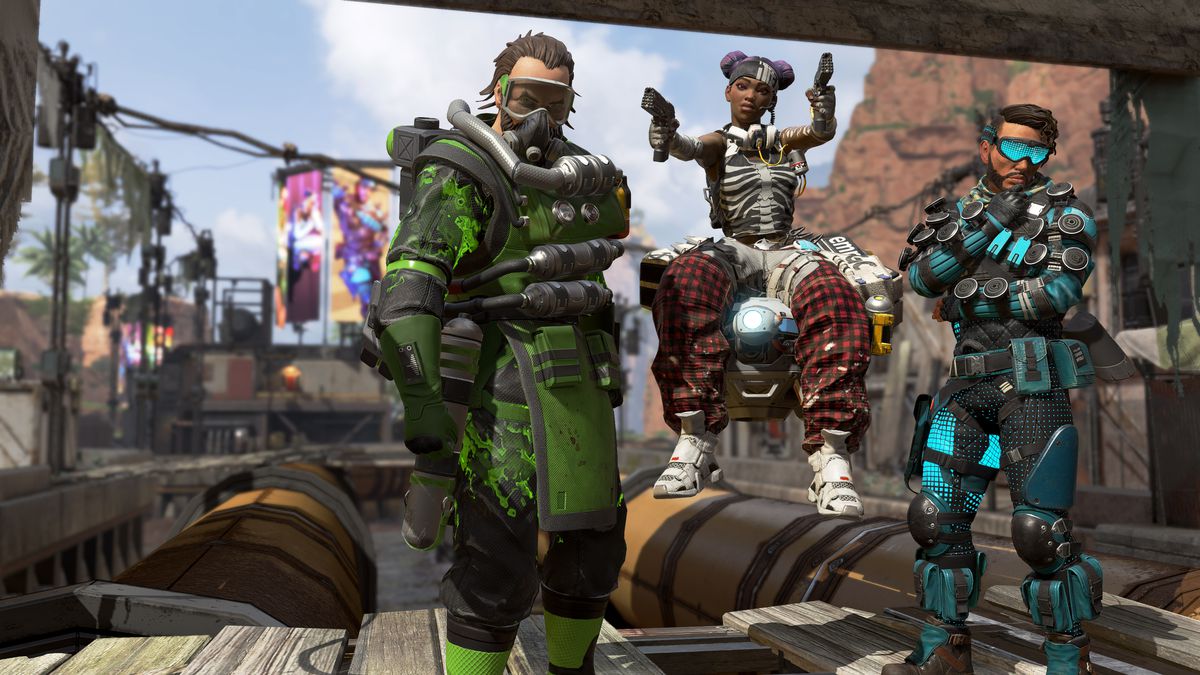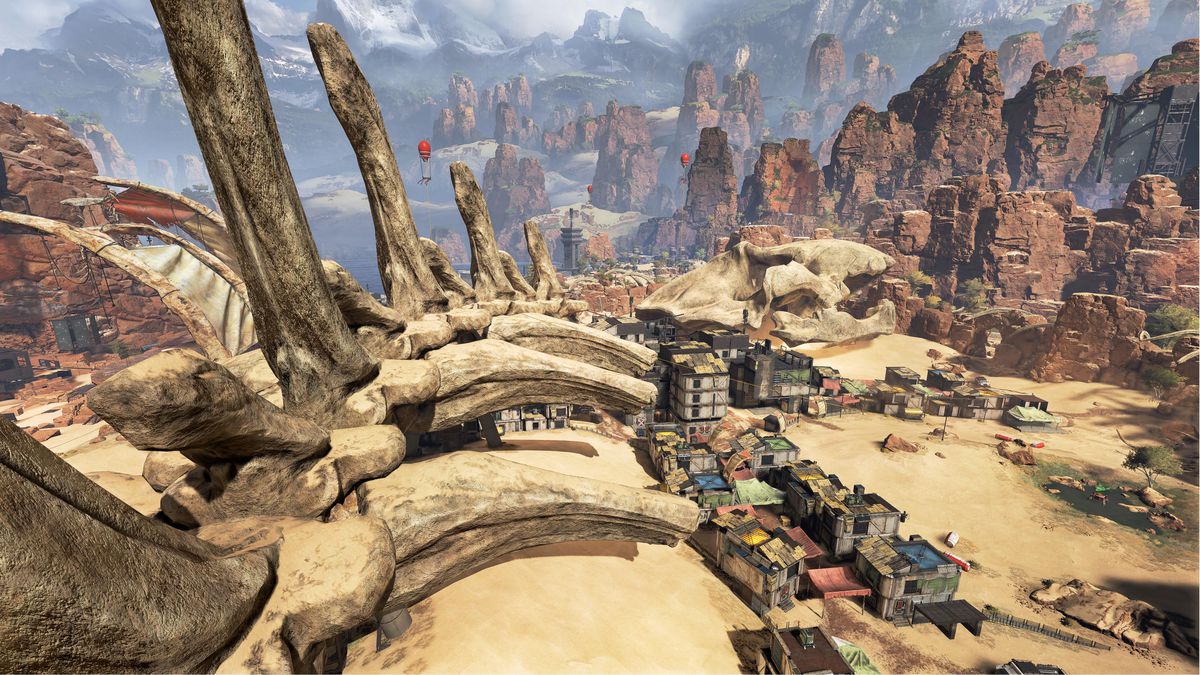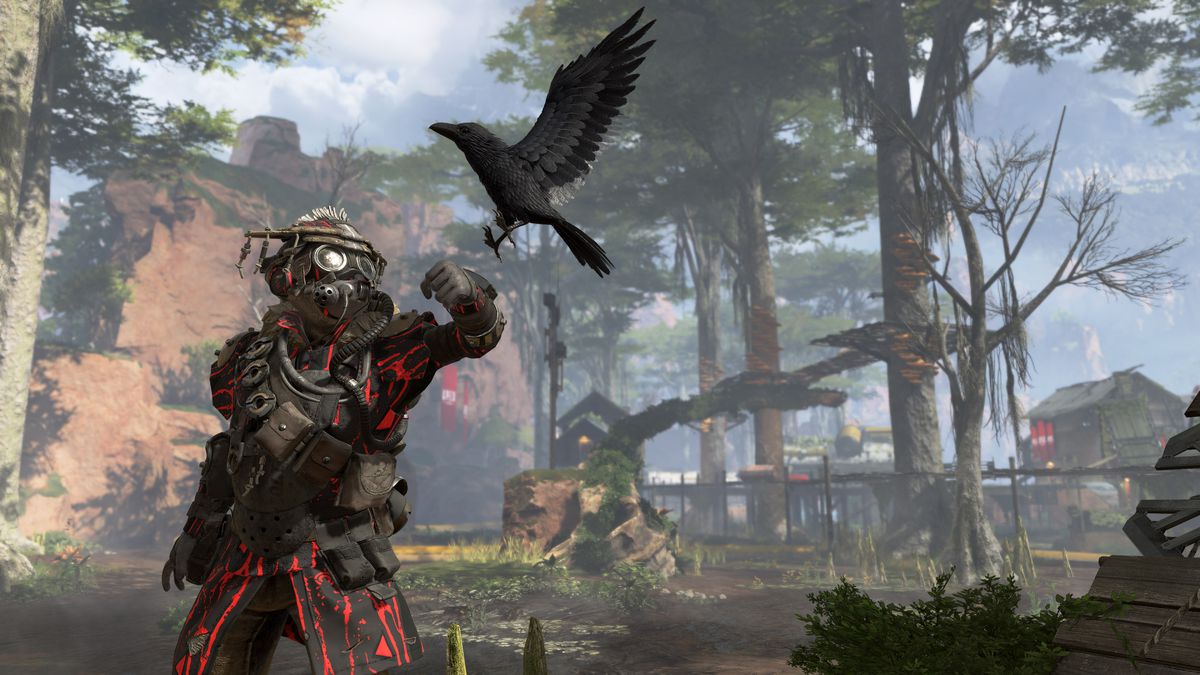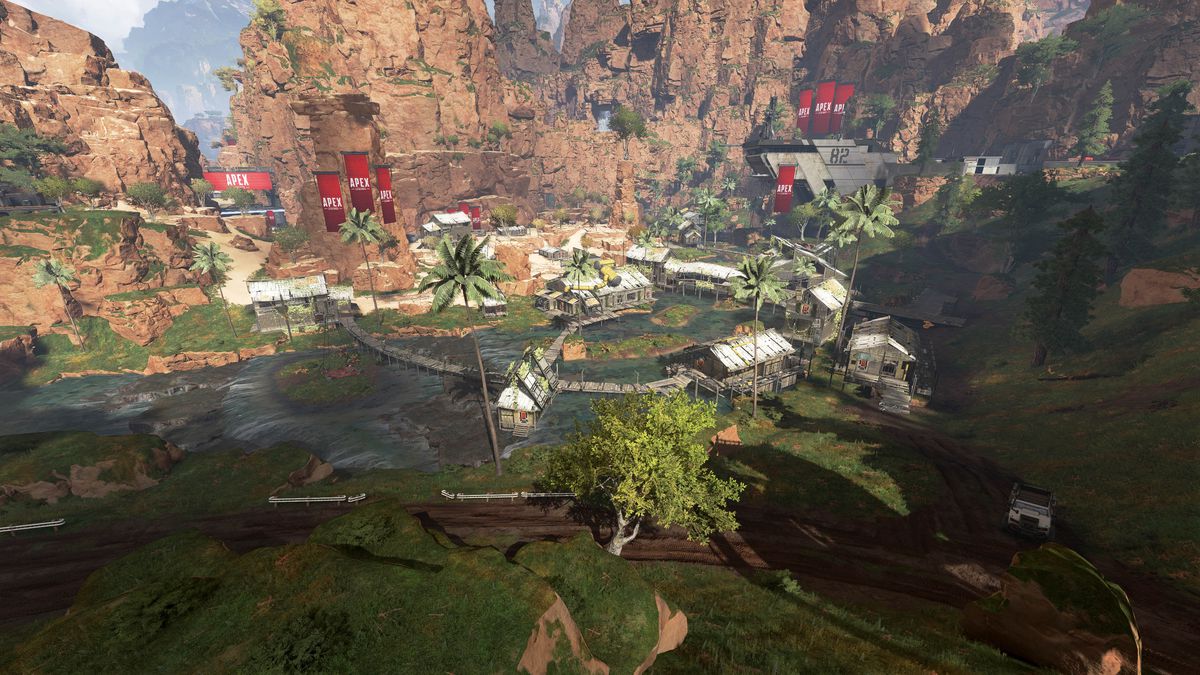When Titanfall studio Respawn gathered members of the press at a hotel in Los Angeles last week, the crowd knew they were going to see a new game, one with a peculiar shroud of secrecy around it. In fact, up until that point, no trace of the title had been talked about, leaked, or discussed before. And afterward, even knowing the game’s name, I was unable to find any shred of its existence on the internet — that is until it starting leaking over the weekend.
But the secrecy is for good reason: Respawn, now owned by Electronic Arts, wants to ensure that its newest product can sidestep every expectation players might impose upon it before they get a chance to boot it up and play. The game is not a sequel to Titanfall 2, but it is set in the Titanfall universe. It’s called Apex Legends, and it’s a free-to-play battle royale game in the vein of Epic Games’ hugely successful and influential Fortnite. In keeping with the surprise approach, the game isn’t just being announced today: it’s also launching. You can download it right now on PC, PS4, and Xbox One.
The launch strategy marks a drastic shift for a traditional, big-budget studio like Respawn, and it marks an even more radical one for EA, one of the world’s largest and most conservative game publishers. The goal is to get the game out as quickly as possible, so players can jump in and see for themselves how Respawn has remixed the battle royale genre before drawing inevitable comparisons to what it will be competing against.

Having played a fair number of hours of the game on private servers at the event last week, I can say the early signs look good. It is an incredibly fun, polished, and thoughtful first-person BR shooter. Broadly speaking, it feels like the first proper, major studio competitor to Fortnite that hasn’t been designed as some secondary game mode, like the Call of Duty and Battlefield variants, or a half-baked, early-access clone or mobile title.
“This wasn’t a game any of us expected to make at Respawn after Titanfall, including myself,” Drew McCoy, executive producer on Apex Legends, told the press gathering last week. But after putting together a prototype that was equal parts “janky and ugly” and “really fun,” Respawn decided to throw the entire studio at the project. “We were going to make a triple-A, proper game out of battle royale,” McCoy added.
Apex wears its inspirations on its sleeve. Starting in 2017, PUBG established the modern BR approach, with its large server sizes and shrinking map zone. Just six months later, Fortnite arrived on the scene and pioneered the approach of treating the genre as an ever-evolving live service. With its free-to-play mode, its battle pass subscription service, and the near-constant changes to its map and its game modes, Fortnite exploded in popularity. No game has been able to successfully dethrone it since, thanks to Epic putting its full weight behind Fortnite and tasking a small army of developers with updating it weekly. It’s now a game industry juggernaut, earning an estimated $2.4 billion in 2018 alone and counting an audience north of 200 million registered players.
With Apex, Respawn wants to show what a BR game can look like if done by one of the best action game studios around. What made Titanfall so great was not just the fact that you could call a mech suit from the sky and transform your experience into a video game version of Pacific Rim in mere seconds. It was also the game’s stunning rhythm — the way matches had natural ebbs and flows to the chaos of combat and how strategic movement features like wall running and grappling hooks made fighting outside your titan a total blast. It was also more approachable for casual players by including AI enemies to take down while you waited for your titan to charge.
Apex does not have titans; McCoy was careful to stress that titans, as a power fantasy, don’t play nice in games where you only have a single life and balance is paramount. But Respawn’s BR game is still drastically different than its contemporaries. It is a three-person, squad-only competitive shooter with a maximum match size of 60 players, as opposed to the 100-person, solo-duo-squad mix offered by Fortnite and its many copycats. Like Call of Duty: Black Ops 4’s Blackout mode, Apex Legends is first-person only.

But there’s more to differentiate it beyond those logistical nuances. It is a class-based shooter, drawing on influences like Rainbow Six Siege and Overwatch. You can pick from up to six starting classes, with two additional classes at launch that can be unlocked by playing the game and earning currency or purchasing them outright from the in-game store. Classes each have three abilities: one passive one, one tactical one on a multi-second cooldown, and one ultimate that charges up over the course of many minutes and can be used only sparingly in a single match. Mixing and matching abilities between classes is one way Respawn hopes Apex can stand out from the pack.
The classes, referred to as legends in the game, aren’t just your standard fill-in-the-blank shooter presets, either. Each is designed with a personality and flair fitting for an Overwatch hero. For instance, Wraith, a cold and unforgiving female assassin character, can warp through space-time, which lets her become invincible and invulnerable to escape attacks and create warp tunnels for her teammates. There’s also the hardened weapons expert Bangalore, who can call in missile strikes and drop smoke bombs. Mirage, a witty, playful combatant, can create holograms of himself to distract enemies and squeeze out of tight situations.
The others, like the poison gas-using Caustic, the enemy-tracking Bloodhound, and the medic-focused Lifeline, all bring unique twists to combat. There’s even a robot character, not unlike Overwatch’s Bastion, that can hack terminals to reveal the next circle and set up grappling hook lines for his teammates to scale skyscraper-sized structures.
Where Apex really starts to shine, beyond the novelty of having ultimate attacks, is in all the thoughtful ways Respawn tries to make the team experience more enjoyable. “We, early on, decided it was going to be a team game, and that creates a whole lot of problems in a battle royale you have to solve,” McCoy told me in an interview. “Most games solve it by adding solo. We want to solve it by making a better team game.”
For one, the game encourages you and your teammates to drop together by randomly selecting one member of the team to fly all three of you in. This avoids squabbling over where to drop and how best to ensure all of your squadmates are together from the get-go. (There’s also no fall damage, so you and your team can go pretty much anywhere at any time to sync up if you get separated.) There’s also a surprisingly robust ping system that lets you identify almost anything of interest on the map with visual indicators. If you don’t have a mic or don’t feel like crowding the communication channel with constant call outs, you can just click in your mouse wheel or controller thumbstick and identify whatever it is for your teammates. It works for everything from armor and ammo to enemies and unopened supply crates.

Perhaps the biggest twist to Apex is that you can revive your teammates after they have died. Like other BR games, you can be instantly revived once you’ve been downed, and Respawn made that process a bit more forgiving by giving you a shield to deflect enemy gunfire as you crawl to safety. But if you’re unlucky enough to get totally taken out, your teammates can collect a token from your body and take that to a respawn location to bring you back into the fight, although you’ll be revived with none of your prior guns and armor.
It’s a huge change to the standard rhythm of a BR game because it now gives your teammates reason to stick around and stay invested in the remainder of a match. In Fortnite, if you get taken out, you’re out of luck and you have to watch your teammates carry on without you, or disconnect from the match and start up a new one without your friends. In almost all my matches in Apex, my teammates stuck around after dying and we would make it our mission to get them back into the match if we could manage it.
As for how Apex plans to make money, McCoy was quite upfront about it. There will be a few systems in place. There will be a Fortnite-style battle pass seasonal subscription for unlocking new legend costumes, character animations, weapon skins, and other cosmetics. (There do not appear to be emotes in the game as of right now, perhaps to avoid the many lawsuits that have been filed against Epic over Fortnite dances.)
There will also be loot crates with randomized cosmetics that you can buy with in-game currency and real money, but Respawn says it will post drop rates in-game and on its website, and will never give you something you already have. Finally, there will be both a direct purchase shop, also borrowed from Fortnite, and purchasable legends. The latter is likely to be the real moneymaker for Apex, as it will restrict certain character classes behind that paywall on a seasonal basis. But McCoy says that, like Rainbow Six Siege’s system, you will be able to unlock these classes by just playing the game and earning in-game currency. (McCoy says, unfortunately, there will not be cross-platform play or cross-platform progression at launch, although he says Respawn is considering the former.)
McCoy wasn’t shy about discussing EA’s controversial history with monetization, especially after last year’s Star Wars Battlefront mess and an already-brewing debate around how the publisher is marketing and selling its new open-world shooter Anthem. “No question the EA has had some reputation about how they do monetization in the past,” he says. “We’ve gone with a very player’s-choice-style mentality. We’ve taken lots of inspiration from games that do monetization really well. Our goal for player spending in Apex Legends is to have a fair and transparent system… pay to look good, not to win.”

Of course, none of this would really matter all that much if the game weren’t fun. But in my time playing Apex, I can confidently say that it replicates the tense, pulse-pounding moments of my first PUBG matches. Firefights feel dynamic and fresh thanks to all the subclass abilities. The map is gigantic and, although it looks largely like a desert expanse, involves a refreshing amount of verticality, letting you climb and fight across huge structures scattered about.
In one especially tense match, my team was one of the last two alive. Playing Wraith, I found myself trapped in a room as the last of my two teammates went down. With the final player closing in on me, I chose not to go for the revive and warped through the door, unseen, using Wraith’s special power. I positioned myself underneath the house and, in a stroke of luck, managed to peek out at the perfect moment and catch my enemy flat-footed. I secured the victory, and immediately let out a heavy breath.
My heart was racing and, little did I know, four or five Respawn employees were watching me play. To their satisfaction, I said I needed a short break after that match. Apex Legends is a whole lot of fun, but like the best BR games, squeezing out a win can be overwhelming and intoxicating in equal measure. But the success of the game will hinge on whether, like Fortnite, it can keep delivering that rush to millions of players, young and old and on console and PC, and not become yet another also-ran in the game industry’s increasingly cutthroat battle royale contest.
https://www.theverge.com/2019/2/4/18209895/fortnite-apex-legends-respawn-ea-battle-royale-free-release-date-hands-on

